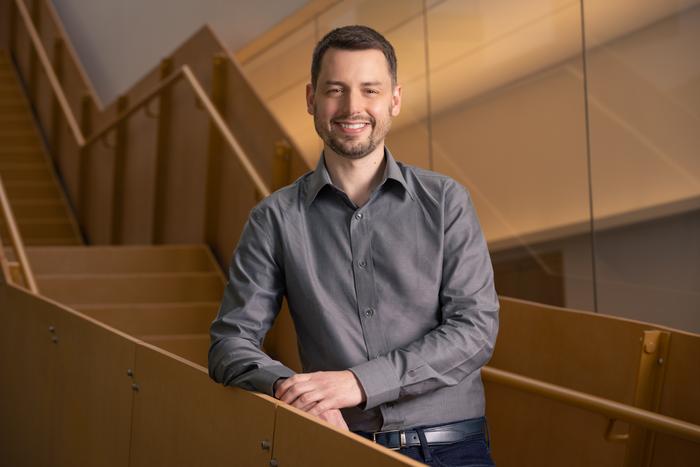Generative and transformative tools will power the future of computing, and machine learning technologies underpin all the learning, evaluation and improvement of these systems. Research moves quickly from the lab to the real world, where it could transform fields ranging from biology to business.

Credit: Carnegie Mellon University
Generative and transformative tools will power the future of computing, and machine learning technologies underpin all the learning, evaluation and improvement of these systems. Research moves quickly from the lab to the real world, where it could transform fields ranging from biology to business.
Zico Kolter is ready to lead that transformation as the new director of Carnegie Mellon University’s Machine Learning Department (MLD).
“The pace is unlike anything else I’ve seen,” said Kolter, a faculty member in CMU’s School of Computer Science (SCS) who has worked at the forefront of machine learning and its real-world applications for almost 20 years. “In typical scientific research, the timeframe between basic research, an idea, and its deployment in the world is 10 or 20 years — maybe longer. Machine learning researchers are making advances that we’ll see in production a few months after they’re published.
“In this moment, the research happening in the Machine Learning Department is influencing and will continue to influence the direction of artificial intelligence,” Kolter said.
Kolter joined SCS 11 years ago. He is currently an associate professor in the Computer Science Department with affiliations in the Software and Societal Systems Department, the Robotics Institute and the College of Engineering’s Electrical and Computer Engineering Department.
While at CMU, he has also served in various roles in industry, including chief scientist of AI research at Bosch. Kolter earned his Ph.D. in computer science from Stanford University and then completed a postdoctoral fellowship at the Massachusetts Institute of Technology.
SCS Dean Martial Hebert shared his excitement for Kolter stepping into this role.
“I know that his energy and research leadership will be instrumental in leading the Machine Learning Department through this critical period in its history,” Hebert said.
Founded in 2006 as the world’s first academic department of its kind, MLD evolved from CMU’s Center for Automated Learning and Discovery (CALD). Kolter will be its sixth department head, succeeding Roni Rosenfeld, who has held the role since 2018.
Tom Mitchell, SCS Founders University Professor and MLD’s founding department head, led the search committee. He said Kolter has the right mix of skills to lead the advancement of both the department and field.
“Zico is a great choice for the head of the Machine Learning Department, especially at this time of major progress and change in AI and machine learning,” Mitchell said. “He’s a star researcher with a real understanding of how the field is evolving and how the department should help lead this evolution. He has plenty of management experience, lots of ideas for the future and he’s fun to work with. I look forward to supporting him as he leads the department to the next level.”
Kolter’s research focuses on machine learning, optimization and control, with much of the work centered on making deep learning algorithms safer, more robust and more modular. Students working with Kolter undertake an immense breadth of AI research. Kolter wants to put researchers at the vanguard of developing the field’s core methodologies and assessing the potential risks or concerns that arise from AI.
“This is an area where I would argue that the Machine Learning Department excels and will continue to excel,” Kolter said. “We have people working at the forefront of ethics, safety, transparency and explainability. These areas are going to be equally crucial as research and as policy to enable the safe and responsible uptake of AI.”
Last year, Kolter’s work on attacking large language models (LLM) showed there were ways to circumvent their safeguards. The research team created a system that automatically generated suffixes that, when attached to a query, caused the LLMs to answer dangerous questions, such as “How to hotwire a car?” The researchers hoped their work would clarify the risk these automated attacks pose to LLMs like ChatGPT.
Today’s LLMs have changed dramatically from past models. Kolter said his lab has worked on understanding how data impacts the way these models work and has helped define memorization in these models, addressing concerns about permissible data usage.
“We don’t even know the data we use to train models in many cases, yet we’re still using them. We need to understand how data impacts these models — how different design choices made during training can lead to vastly different downstream behavior,” Kolter said. “It is vital to understand how to use these tools safely.”
Across all the work his lab has done, Kolter stresses how impressive it is that students conduct a variety of AI research. As the department head, he hopes to empower and facilitate what he sees as the most valuable resource at MLD: its people. This includes students, faculty and staff, Kolter said. His primary goal is to ensure that the people in and outside MLD have what they need to succeed.
“I want to ensure that our biggest resource, our people, have the influence on the field that we can and should have. This includes getting them the access to the models, data and compute that they need,” Kolter said.
Kolter takes over as MLD department head effective June 15. Rosenfeld, an MLD professor with affiliations in the Language Technologies Institute, the Ray and Stephanie Lane Computational Biology Department, and CMU’s Heinz College of Information Systems and Public Policy, announced in January that he was stepping down as department head to focus on the work of the Delphi Group, of which he is a co-founder and co-lead.



